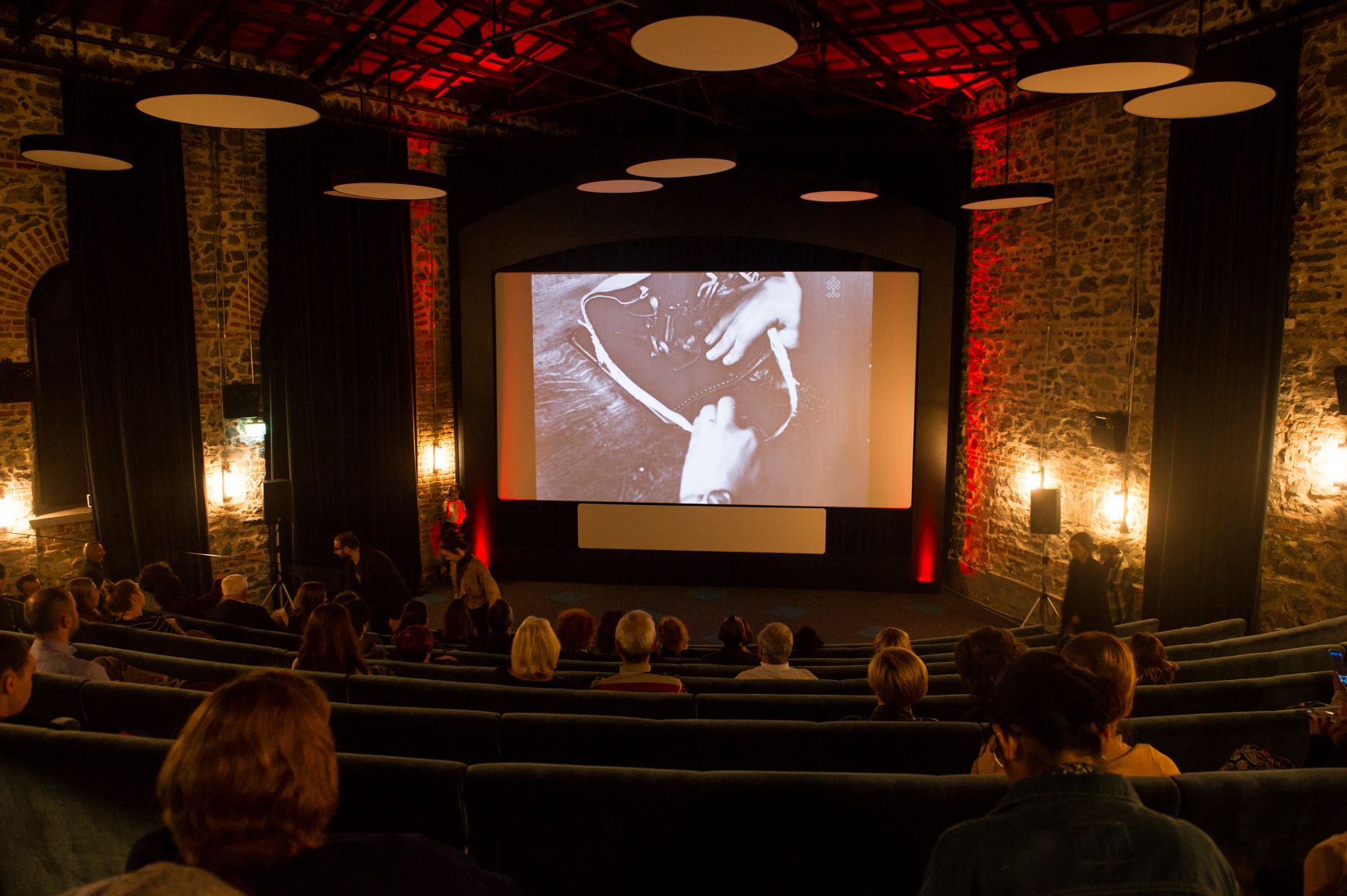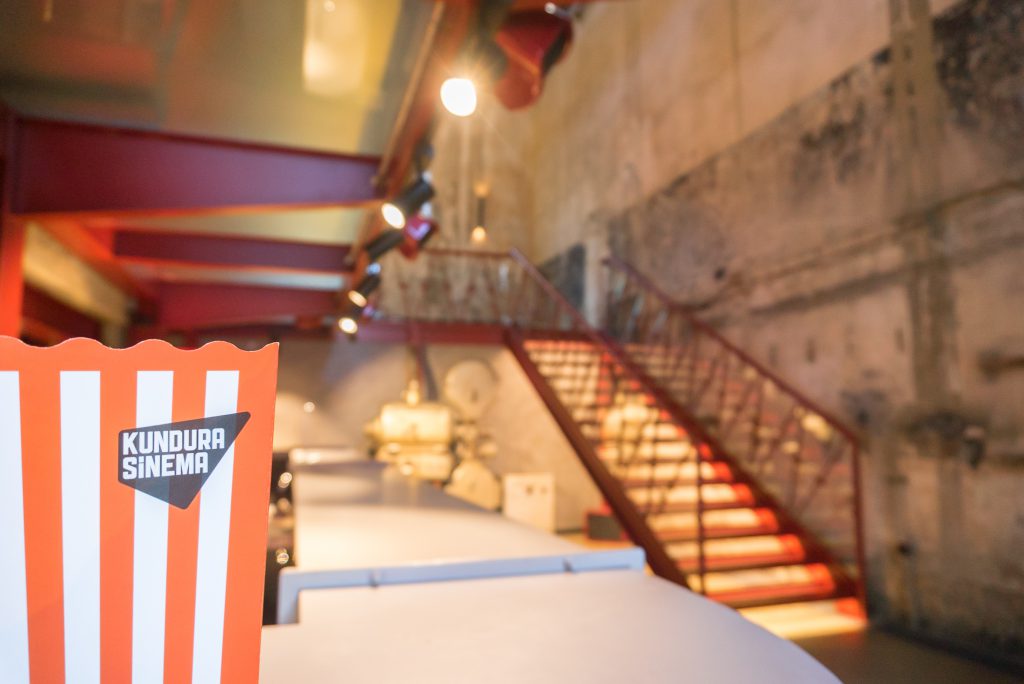
09 Haz Powerful storytellıng ıs a source of solıdarıty
Interview with S. Buse Yildirim
Kundura Cinema
Could you tell us a bit more about Kundura Cinema’s mission? How do you position Kundura Cinema in the context of cinema culture in Turkey and beyond?
Kundura Cinema is part of a cultural placemaking project. It is located at the former boiler house of the old shoe factory Beykoz Kundura, which is a place of significant industrial heritage in Istanbul. The cinema is a product of a core intention to sustainably repurpose this post-industrial site. Our mission is to create a new identity for this location, acknowledging the weight of history that comes with this site. For this reason, our story began with the memory project, Kundura Hafiza, through which we were able to uncover untold stories, and gain a better understanding of the social history of this site and of our collective identity. Following the traces of these narratives helped us to consider how we could construct a cultural destination while also developing an insightful approach to the adaptive reuse of the space. Kundura Cinema aims to invite its audience to acknowledge our past and our shared memory. Through our curation, we remind our audiences of this heritage and we encourage them to engage with the stories behind our programme. First and foremost we hope that our audience will become a part of this ongoing journey, with their relationship to themselves and the space forming part of the placemaking process.
Our focus at Kundura Cinema is on designing experiences. We believe that film exhibition should not merely mean bringing films to audiences, but rather that our events should be spatial, immersive experiences that begin from the moment the will of discovery emerges. Our cinema and its surroundings complete each other. Through experimentation, we attempt to bridge past and future and embrace change, while also keeping those bonds with the memory of cinema, and with the inherited legacy of our post-industrial space.
Kundura Cinema’s film programmes span across a wide spectrum of filmmaking practices: from experimental to feminist films; from documentaries to Hollywood classics. How does the choice of films shape the different types of audience of your cinema space?
The location of the cinema and our curatorial policy create natural filters and frames for audience development. As our space is a part of industrial heritage, and partially public, we cannot keep it just for ourselves or for a very niche target audience. As the space belongs to the public, we offer a diversity of genre, and we attempt to reach as wide an audience as possible through our curatorial storytelling. This approach is reflected not only through our curatorial policy, but also through our sales strategy, where we aim to create a sense of balance. For instance, if a programme is ticketed, then we also ensure that we include free screenings within the season.
We aim to allow our audiences to design their own experience, and what is most important here is that we provide enough material to allow them to do this. We find that good quality and original hand-picked programmes also lead to the most interested and dedicated audiences.
Experimenting with exhibition formats can also shape the audience. Although to a degree we determine the boundaries of the cinematic encounter, we also try to leave space for audiences to manage their own experiences. For instance, we organise walk-in cinemas with short films and artists’ films, in which visitors can manage their time and space freely. We find that this format appeals mostly to younger audiences.

To what extent is the programme of Kundura Cinema shaped by the memory of its location, Beykoz Kundura?
When we were conducting oral history interviews as part of the Kundura Memory Project, we were mostly interested in finding out about the social life of the factory. The factory management used to transform the food hall into an indoor cinema after the end of shifts. During the summer time they used to organise an open-air cinema in the garden of the factory, and this inspired us to kick off our open air film festival Midsummers Night Festival. By the way, we still conserve the carbon arc lamp projector left from the factory time – this still welcomes visitors in the foyer of the cinema today.
We were curious about what type of films they were watching back then. It was very interesting to hear that a wide range of films were shown, from Ben Hur to Esther Williams’ films up to Yeşilçam classics. During this process of historical exploration, I discovered the world of classical restoration. Thanks to the support of Elif Rongen Kaynakçı, who is a curator of silent film at the EYE Filmmuseum, Kundura Cinema now finds itself at the very heart of this repertory cinema world. Every year on the 27th of October, we celebrate Unesco’s audio-visual Heritage Day by selecting a film to screen that reminds us of the importance of heritage. The main strand of our curation centres on restored classics and silent film screenings with live music accompaniment. Of course, we also have plenty of programmes with short films and also feature length creative documentaries along with classics.
What does Cinema of Commoning mean to you? What is it about film that can create solidarity, in your opinion?
Powerful, timeless storytelling is a source of solidarity. Cinema of Commoning represents a space for encounters and for exchanging shared values based on our filmic missions. We believe that we can make locality more valuable within global solidarity. We can see how sharing different layers of experience and knowledge can help us to break down vicious cycles in the structure of cultural production. This is the most convenient and healthiest way to keep ourselves vibrant and innovative.
Buse Yildirim (b. 1988) is a curator and filmmaker based in Istanbul. She played an essential role during the construction of the industrial heritage site Beykoz Kundura, and in 2015 she founded the non-profit association Kundura Hafiza. As managing artistic director of Kundura Cinema & Stage, she also curates creative programmes. Her film and video works have screened at various festivals such as RAI Film Festival, Göttingen International Ethnographic Film Festival, Ethnofest Athens, and at many other conferences and galleries.


